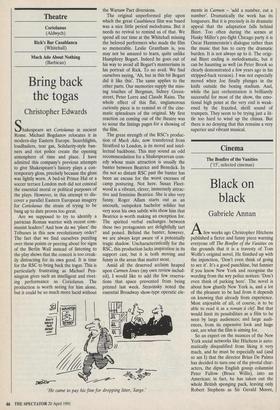Theatre
Coriolanus (Aldwych)
Rick's Bar Casablanca (Whitehall) Much Ado About Nothing (Barbican)
Bring back the togas
Christopher Edwards
Shakespeare set Coriolanus in ancient Rome. Michael Bogdanov relocates it in modern-day Eastern Europe. Searchlights, loudhailers, tear gas, Solidarity-style ban- ners and riot police create the opening atmosphere of time and place. I have admired this company's previous attempts to give Shakespeare's history plays a con- temporary gloss, precisely because the gloss was lightly worn. A bed-sit Prince Hal or a soccer terrace London mob did not conceal the essential moral or political purposes of the plays. However, in this attempt to dis- cover a parallel Eastern European imagery for Coriolanus the strain of trying to be bang up to date proves too great.
Are we supposed to try to identify a patrician Roman warrior with recent com- munist leaders? And how do we 'place' the Tribunes in this new revolutionary order? The fact that we find ourselves puzzling over these points or peering about for signs of the Berlin Wall instead of listening to the play shows that the conceit is too creak- ily distracting for its own good. It is time for the RSC to bring back the togas. This is particularly frustrating as Michael Pen- nington gives such an intelligent and rivet- ing performance as Coriolanus. The production is worth seeing for him alone, but it could be so much more lucid without
the Warsaw Pact diversions.
The original unperformed play upon which the great Casablanca film was based was a nice little period melodrama. But it needs no revival to remind us of that. We spend all our time at the Whitehall missing the beloved performers who made the film so memorable. Leslie Grantham is, you may not be amazed to learn, quite unlike Humphrey Bogart. Indeed he goes out of his way to avoid all Bogart's mannerisms in his portrait of Rick. To no avail. We find ourselves saying, `Ah, but in this bit Bogart did it like this'. The same applies to the other parts. Our memories supply the miss- ing touches of Bergman, Sidney Green- street, Peter Lorre and Claude Rains. The whole effect of this flat, unglamorous curiosity piece is to remind us of the cine- matic splendours of the original. My first reaction on coming out of the theatre was to scour the listings pages for a showing of the film.
The great strength of the RSC's produc- tion of Much Ado, now transferred from Stratford to London, is its moral and intel- lectual backbone. This may sound an odd recommendation for a Shakespearean com- edy whose main attraction is usually the banter between Beatrice and Benedick. In the not so distant RSC past the banter has been an excuse for the worst excesses of camp posturing. Not here. Susan Fleet- wood is a vibrant, clever, immensely attrac- tive and feminine Beatrice. She is also very funny. Roger Allam starts out as an uncouth, outspoken bachelor soldier but very soon his own subtle wits show him that Beatrice is worth making an exception for. The spirited verbal exchanges between these two protagonists are delightfully tart and poised. Behind the banter, however, we are always kept aware of a potentially tragic shadow. Uncharacteristically for the RSC, this production lacks inspiration in its support cast, but it is both moving and funny in the areas that matter most.
Amid all the deserved acclaim heaped upon Carmen Jones (my own review includ- ed), I would like to add the few reserva- tions that space prevented from being printed last week. Stravinsky noted the essential Broadway show-type operatic ele- 'He came to pay his fine for dropping litter, Sarge.' ments in Carmen — 'add a number, cut a number'. Dramatically the work has its longueurs. But it is precisely in its dramatic appeal that the adaptation falls behind Bizet. Too often during the scenes at Husky Miller's pre-fight Chicago party it is Oscar Hammerstein's dialogue rather than the music that has to carry the dramatic burden. It is not always up to it. The origi- nal Bizet ending is melodramatic, but it can be haunting as well (as Peter Brook so clearly demonstrated a few years ago in his stripped-back version). I was not especially moved when Joe finally plunges in the knife outside the boxing stadium. And, while the jazz orchestration is brilliantly successful for most of the show, the emo- tional high point at the very end is weak- ened by the frazzled, shrill sound of trumpets. They seem to be trying just a lit- tle too hard to wind up the climax. But there is no denying that this remains a very superior and vibrant musical.


























































 Previous page
Previous page